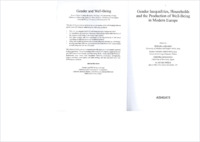Institutional constraints and intra-family inequalities in access to education. Swiss federalism and the gendered well-being of siblings (Switzerland 1880-1930)
BHT
- Praz, Anne-Françoise ORCID Université de Fribourg
- 2010
Published in:
- Gender Inequalities, Households and the Production of Well-Being in Modern Europe / Addabbo, Tindara ; Arrizabalaga, Marie-Pierre ; Owens, Alastair. - Aldershot (UK) and Burlington (USA): Ashgate Publishers. - 2010, p. 197-217
English
This chapter focuses on a particular type of intra-family inequality: the respective position of male and female siblings in the trade-off between family work and schooling. The data used were collected in the Swiss cantons of Vaud (VD – Protestant) and Fribourg (FR – Catholic), for the period 1880–1930. In each canton, two villages have been selected with respect to economic factors, in order to isolate the impact of institutional variables.
For the examination of the institutional and cultural frame, we gathered for each canton a selection of qualitative material (political discourse, educational periodicals, etc). To measure the level of education attained and the school leaving age for individual children, we used our demographic database, adding information from administrative sources. For the 5,042 legitimate children who survived after the age 15, we managed to reconstitute the school life of 2,353 of them (1,333 boys and 1,020 girls), data used for our statistical analysis. Our study highlights the power of institutional constraints in shaping educational opportunities, namely through the gendered access to education by specific school policies. When institutional constraints are weaker, family strategies are given more leeway to adapt their short-term economic needs to the features of the local labour market.
For the examination of the institutional and cultural frame, we gathered for each canton a selection of qualitative material (political discourse, educational periodicals, etc). To measure the level of education attained and the school leaving age for individual children, we used our demographic database, adding information from administrative sources. For the 5,042 legitimate children who survived after the age 15, we managed to reconstitute the school life of 2,353 of them (1,333 boys and 1,020 girls), data used for our statistical analysis. Our study highlights the power of institutional constraints in shaping educational opportunities, namely through the gendered access to education by specific school policies. When institutional constraints are weaker, family strategies are given more leeway to adapt their short-term economic needs to the features of the local labour market.
- Faculty
- Faculté des lettres et des sciences humaines
- Department
- Département d'histoire contemporaine
- Language
-
- French
- License
- License undefined
- Open access status
- green
- Persistent URL
- https://folia.unifr.ch/unifr/documents/325787
Statistics
Document views: 33
File downloads:
- praz_2010_gender-and-well-being.pdf: 72
